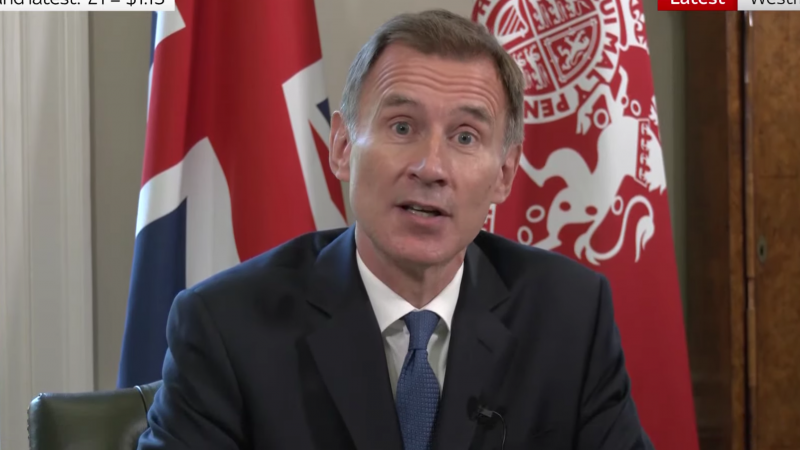
Jeremy Hunt has announced that the Liz Truss administration will “reverse almost all the tax measures” unveiled in the ‘mini-Budget’ that “have not started parliamentary legislation”, marking a significant U-turn on government policy.
In an emergency statement delivered this morning, the Chancellor confirmed that the government would abandon plans for a reduction of the basic rate of income tax from 20% to 19% next April, cuts to dividend rates, IR35 tax changes, VAT-free shopping for tourists and alcohol duty changes announced by his predecessor.
Hunt warned that there would be “difficult decisions” on tax and spending, that government departments would “redouble their efforts to find savings” and that “some areas of spending will need to be cut”.
The Chancellor also confirmed that the ‘energy price guarantee’, as originally unveiled by Liz Truss, will only last until April 2023 and said the government will launch a review to consider a “new approach”.
“Beyond that, the Prime Minister and I have agreed it would not be responsible to continue exposing public finances to unlimited volatility in international gas prices,” Hunt said this morning.
“So I’m announcing today a Treasury-led review into how we support energy bills beyond April next year. The objective is to design a new approach that will cost the taxpayer significantly less than planned whilst ensuring enough support.”
The planned cut to National Insurance contributions of 1.25 percentage points will still go ahead, Hunt confirmed, as will the decrease in stamp duty already announced.
Commenting on the announcement this morning, Rachel Reeves argued that “the damage has been done” and that “the Conservatives have lost all credibility”.
“The Chancellor said that growth requires “confidence and stability” yet it’s clear that the Tories can’t provide this. There will continue to be a huge cost to families because of the actions of this Tory government,” the Shadow Chancellor said.
“We are still flying blind with no OBR forecasts and no clarity of the impact of their mistakes. The humiliating climb-down on their energy plan begs the question yet again – why won’t they bring in a windfall tax on energy producers to help foot the bill? Only Labour offers the leadership and ideas Britain needs to fix the economy and get out of this mess.”
The government had already U-turned on significant parts of the fiscal statement, including proposals to abolish the top rate of income tax and abandoning a corporation tax rise, and Kwarteng was sacked during weeks of political turmoil. Hunt will make a more detailed statement to parliament this afternoon.
Labour has also been granted an urgent question (UQ) in parliament today, calling on the Prime Minister to “make a statement on the replacement of the Chancellor of the Exchequer during the current economic situation”.
The UQ was submitted in the name of Keir Starmer. A spokesperson for Labour said: “With the Chancellor junking the majority of its kamikaze budget today, the Prime Minister should have come to the House to make a statement.
“The damage is done. Mortgages are rising and the cost-of-living crisis is out of control. After days of the Prime Minister attempting to dodge the questions the public has, Labour has now had to force her to come to parliament. If she had a shred of authority left she would turn up.”
Following the mini-Budget delivered by Kwarteng last month, the pound crashed to its lowest level to date against the dollar, government borrowing costs soared and the Bank of England took emergency action in an attempt to calm the markets.
Conservative backbenchers have been openly discussing replacing Truss, who has been in post for just six weeks. The Tory Party rules mean one leadership contest can be held in any 12-month period, however members of the 1922 committee – which sets the rules – reportedly met to discuss changing them over the weekend.
Commenting following Hunt’s statement today, Unite general secretary Sharon Graham said: “For all the announced U-turns, it is really clear that this Chancellor is now preparing the country for another round of austerity.
“There is no suggestion here that profiteering energy companies should pay more or that city bankers should not get unfettered bonuses. When he talks about ‘the difficult decisions that lie ahead’ this is code for workers and communities will pay.”
Common Wealth director Mathew Lawrence warned that the Chancellor’s announcements this morning will mean that “we’re set to face more austerity, which can only mean a deeper crisis for people’s living standards”.
“The UK, already one of the most unequal countries in the OECD, is likely to see widening inequality. An alternative economic plan would prioritise the interests of workers and society as a whole, rather than shareholders. We can and should tax wealth properly,” he added.
“Ending tax loopholes exploited by the rich. Bringing capital gains and dividends tax up to the levels of income tax. And taxing the wealthiest fairly. If we do that, we can build a more equal and just society.”




More from LabourList
‘Tackling poverty should be the legacy of Keir Starmer’s government’
‘The High Court judgment brings more uncertainty for the trans community’
‘There are good and bad businesses. Labour needs to be able to explain the difference’